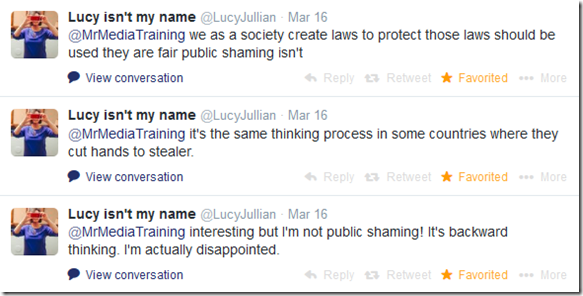Am I Wrong To Shame People Who Plagiarize My Work?
I recently called out a PR professional who appeared to steal my work.
It’s not the first time I’ve done that. Unfortunately, a surprising number of people think little about lifting someone else’s work, and I regularly come across instances in which someone has claimed my work as their own.
But after the last incident, a person on Twitter expressed her disappointment with me, comparing the act of publicly shaming a plagiarizer to the primitive punishment some countries dispense by cutting off the hands of a shoplifter.
That’s a fair philosophical argument, one I’ve been thinking about for a while. But her next tweet surprised me:
If I’m reading her tweet correctly (and given the context of the conversation, I believe I am), this tweeter believes that the person being shamed is the victim. In her view, the “victim” is not the person who worked hard to develop an original idea, share it with the world, and have it stolen—but rather the person who steals the idea and then pays a price for having done so. I strongly disagree with that view.
Why I Shame Plagiarizers
First, let me be clear: Accusing someone of committing plagiarism is a serious option that can badly damage someone’s reputation. I don’t use it lightly. For cases that are on the fence, I send a private email. I would only accuse someone of plagiarism publicly if the facts supporting my claim point overwhelmingly in that direction. In the case above, the PR pro was quoted using an entire paragraph I had published on my blog, in my newsletter, and in my book.
A couple of weeks ago, The New York Times ran an article called “Spite Is Good. Spite Works.” The article had a few passages that are relevant to this discussion:
“Human decency and cooperation require a certain degree of so-called altruistic punishment: the willingness of some individuals to punish rule breakers.”
“’It’s probably not spiteful when you’re looking at the long term,’ Dr. Marlowe said. ‘If you get the reputation as someone not to mess with and nobody messes with you going forward, then it was well worth the cost.’”
For me, publicly calling someone out for plagiarism isn’t an act of spite. The quotes above capture my thinking well: More globally, I do it because it’s about maintaining social norms; more personally, I do it to serve as a future deterrent to both the offender and those who might become offenders.
That’s my view. I’d love to hear yours. You can vote below or leave your thoughts in the comments section below.
[poll id=”38″]



Seems to me there’s something going on with this person. Perhaps she was publicly shamed by someone so she is projecting on to you (not to get all psychological on it). In any case, you have a complete right to defend your work. Whether public shaming achieves that goal is questionable. I remember a while back someone stole your work and did not respond or remove the post, even after the shaming. But then again, what other way do you have?
Thanks for your comment, Deborah.
Regarding “what other way do you have,” you’re exactly right: our options are limited. The person who tweeted me also suggested that I take a private legal approach. The problem with that, of course, is that seeking a remedy through the courts can take years and cost tens of thousands of dollars in legal fees. I’ve actually been close to using that approach before and am willing to do it if necessary (fortunately, I have friends who are litigators), but it’s definitely not a feasible option in most cases.
Thanks for reading!
Brad
If someone publicly takes credit for your work. They should be ready to experience the consequences of their act publicly as well. I wouldn’t call it shaming, but holding someone accountable for their actions.
I voted for option 1, but was tempted to vote for option 3, because as I read the article, I thought: Someone is going to cut and paste this article on their facebook page (or elsewhere) without attribution. Too funny.
P.S. I get why we have to do math to post comments. But I wonder: Could an anti-spam device be used as a teaching method? Who won the Boer War? Who are the only two US Presidents to be impeached? Maybe such questions could be used to insure that the poster knows something about the topic he is commenting on.
Pat,
I like your approach – maybe we’ll do a current events quiz? 🙂
I hate having to use a math question to allow people to comment. That was a necessary step after spammers infiltrated my site with about 30,000 spam comments in a 24-hour period earlier this year. Score another one for spammers.
Brad
I find the use of the phrase “public shaming” an interesting choice, in this sort of context. What you have done, by pointing out the plagiarism, is to simply state a fact. Someone claimed your words as their own and did so publicly.
If they consider this truth to be shameful, is that not simply a reflection on them? I don’t see why you have the obligation to be complicit with them in hiding their bad behavior.
This reminds me of that wonderful quote by Anne Lamott: “If people wanted you to write warmly about them, they should have behaved better.”